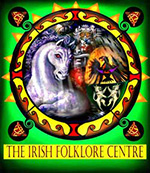This is the third of ‘The Three Sorrows of Storytelling’, and has a great variety of English titles and story-lines. It is a classic and Jeffrey Gantz (1981) describes it as ‘the most stunning tale ever written in Irish’. The earliest surviving text dates to the ninth century, followed by expanded versions in the fourteenth and later centuries. It appears in many anthologies, and even these modern story-lines provide variation. There are many themes in this story: the hiding of a female child because she cause bad things to happen, the lust of an older man for a younger woman, three brothers, the chase by the aggrieved king, a sojourn in Scotland, a geis, a dream of doom and honour betrayed.
Conchobhar mac Neasa, the king of Ulster, was sitting with his chief storyteller, Feidhlimidh, waiting for the latter’s baby to be born. A daughter, Deirdre, arrived to great acclaim until Cathbhadh, the druid, spoke. He said that she would be so beautiful that kings and heroes would fight and kill over her, and great evil and ruin would come to Ulster. The young warriors demanded that she be killed immediately. Conchobhar disagreed and said that he would send her for fosterage where no one would find her; he would then have her for his wife.
Deirdre was raised in a remote dwelling in the hills by a nurse, a teacher and a poetess, Leabharcham. Conchobhar was the only other person allowed near her. She was reaching marriageable age,and said to Leabharcham that she would only love a man who had the colour of raven on his hair, of blood on his cheek and snow on his skin. Leabharcham told her that there was such a man in Conchobhar’s household, Naoise, one of the three sons of Uisliu, and that she would contrive for them to meet. They loved each other at first sight, but Naoise realised that she was Conchobhar’s future wife, and did nothing about it. However, Deirdre was not to be denied, and threatened him with shame and derision if he did not take her away. Naoise’s two brothers warned them again of the risks, but Deirdre’s love was too strong.
The four of them travelled all over Ireland looking for employment with Conchobhar in pursuit. Finally they were forced to go to Scotland, where they offered their swords to the king. The latter was entranced by Deirdre’s beauty and wanted her for his wife, so they fled to a remote island off the west coast.
Conchobhar remained a very jealous man and wanted his revenge. He suggested to his assembled court that he was thinking of pardoning Naoise and his brothers; this was greeted with great joy. He told
Fearghus mac Róich to go to their island and ask them to come home under Fearghus’s protection. In parallel he arranged for a man called Borach to return to his fortress and prepare a feast to which he was to invite Fearghus when he landed back in Ireland. Fearghus carried a geis (see page ) which forbade him from refusing such an invitation.
When Fearghus met the exiled four, Deirdre knew that all was not well and related a dream she had had. She had seen three birds leaving Eamhain Mhacha, carrying three sips of honey to them; they left with three sips of blood. But Naoise was convinced by Fearghus’s protection, and they set off for home. As soon as they landed in Ireland, Fearghus received the invitation and he left them in the hands of his two sons, formidable warriors themselves. All Deirdre’s worst forebodings were coming true. As they approached Eamhain Mhacha she saw a cloud of blood forming over Naoise’s head, and she begged them not to enter Conchobhar’s palace. She told them that, if they were sent into the House of the Red Branch Knights rather than where Conchobhar dwelt, he definitely planned treachery.
They knocked on the door of Conchobhar’s Royal House, and were directed to the other one. Again Deirdre pleaded with Naoise to flee. Fearghus’s sons stated their determination to protect them was all they needed. Meanwhile Conhobhar sent Leabharcham to check that Deirdre was as beautiful as ever. She warned the four, who were very dear to her, to bar and bolt all the windows and doors, and to prepare to defend themselves, as they were in terrible danger. Returning to Conchobhar, she told him that Deirdre was no longer a beauty. Suspicious, Conchobhar sent a sworn enemy of Naoise to verify this statement. He returned with the news that there was no diminution in Deirdre’s loveliness.
Conchobhar sent in a series of groups of mercenaries to attack Naoise and his companions, because no man of Ulster (other thatn his own son) would carry out his orders, such was their disgust. Fearghus’s sons were killed, but the three brothers took a terrible toll of their attackers, until Conchobhar offered peace, if Naoise and his brothers would lay down their arms. Foolishly believing in his word, they did so, and were executed.
Conchobhar forced the grieving Deirdre to live with him for a year, treating her appallingly. Finally, while out with him and another man she hated, she hurled herself from the chariot and dashed her head against a rock.
